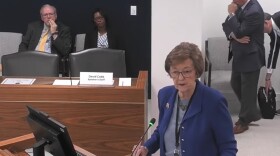State lawmakers completed a chaotic final day of the legislative session in Raleigh on Friday, giving final approval to a $22.34 billion dollar state budget before sending it on to the Governor.
The Legislature rejected a proposed change to Asheville City Council districts and passed a minor change to the controversial House Bill 2. And in the midst of the final legislative push, lawmakers learned that the 4th Circuit Court of Appeals struck down some of their earlier work that altered voting districts.
Friday featured some of the fiercest debate of the session and a farewell to several of the most powerful lawmakers.
In the morning, the House approved the budget plan previously passed by the Senate. The measure provides teacher raises and gives a slight increase in pay for state employees. It also makes changes to the tax code, caps tuition at three UNC universities and contribute $475 million to the state’s rainy day fund.
Appeals Court Strikes Down Wake County Redistricting Maps
The hectic first day of the fiscal year was interrupted by a judicial ruling.
As lawmakers began ducking in and out of committee meetings, caucuses, and floor sessions, news broke that the Fourth Circuit Court of Appeals in Richmond struck down two redistricting laws passed by the General Assembly in 2013 and 2015.
The maps in question were drawn by Republican lawmakers for Wake County School Board and Wake County Commissioner districts in 2013 and 2015, respectively. Citizens filed suit alleging the new districts violated state and federal requirements for one person, one vote.
The three-judge panel agreed with the plaintiffs and deemed the maps unconstitutional. The court issued a permanent injunction and returned the case to a federal court in Winston-Salem. The effect of the ruling remains unclear, but experts believe the districts may return to the lines drawn before the latest changes.
No new districts for Asheville City Council
Meanwhile, heated debate on the House floor focused on a measure aimed at redrawing Asheville City Council districts. The bill, introduced by outgoing Senate rules chair Tom Apodaca (R-Henderson), was opposed by local officials in the western part of the state.
In a surprising 58-48 vote, the measure did not pass. Apodaca, who has been one of the most powerful members of the legislature since Republicans gained control in 2010, was red in the face moments after the down vote. He remarked that the House was sending him off with a goodbye present.
No agreement on environmental reform measures, constitutional amendments, water testing
Another surprise came when, for the first time since Republicans have had control of both chambers, there was no send-off regulatory reform bill. It is customary for legislators to pass environmental reform measures at the end of the session. The House and Senate could not agree on several measures in the final days and adjourned without addressing the regulations.
Legislators in the two chambers also were unable to come to agreements on possible constitutional amendments, changes to the I-77 toll road and testing water in schools for lead.
Friday also marks the end of the legislative careers for Paul "Skip" Stam, Bob Rucho and Apodaca, among more than two dozen who are not seeking re-election. When the Legislature reconvenes in January there will be some powerful positions vacant.









